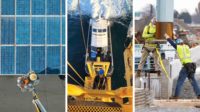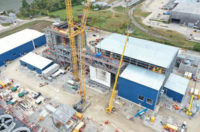Japan’s nuclear disaster has pushed new debate and pause on global nuclear power development, but few nations are canceling projects.

Citing concerns over Fukushima Daiichi, China called for a timeout March 16 in developing the world’s largest nuclear fleet (see chart) to revise safety standards. The announcement could affect four AP 1000-design units being built by The Shaw Group and Westinghouse, two others they are helping to design and two Areva-developed reactors, but the firms say they have not yet been told to stop work. China had planned to have 80 GW of nuclear power online by 2020.
Europe’s governments have called for new safety reviews. The Brussels-based European Commission, which governs the 27-country European Union, will “stress- test” nuclear plants to focus on exposure to floods and earthquakes, backup power supplies as well as reactor type and age. But countries will still decide whether to close plants or freeze new construction, says EC Energy Commissioner Gunther Oettinger. “Until we have a better understanding of technical [issues], we need to refrain from making any premature policy decisions that could have significant implications for Europe’s energy future,” said Brussels-based pro-nuclear group FORATOM,
German Chancellor Angela Merkel has been the most outspoken, ordering a safety study of all German plants. Seven commissioned before 1980 were ordered to shut during the review. Spain’s look at an aging 1,092-MW boiling water reactor west of Valencia comes weeks before it was set to be invaded by Greenpeace, which wants it shut on safety grounds.
Nuclear energy is a contradictory and confusing business in India, with activists claiming the government has sold its sovereignty to foreign nuclear development deals. The stakes are high, with forecasts of a nuclear energy sector attracting investment of nearly $100 billion by 2014. India aims to expand nuclear power capacity to 63,000 MW by 2032. It now generates 4,560 MW, less than 3% of the energy mix.
Japan’s crisis unleashed a barrage of protests against a $10-billion complex in the western state of Maharashtra, won by Areva. When commissioned, it is set to be the world’s largest nuclear power project. Critics point to its location in a seismic and tsunami-prone zone. While the government has said it will not slow down India’s nuclear power plans, there are signs the project will be delayed.
Turkey vowed to go ahead with its plans to build two nuclear powerplants despite rising concerns over safety. “We will build a third-generation powerplant. Fukushima is a first-generation plant,” said Minister of Energy Taner Yildiz, noting its design to withstand a magnitude 8 earthquake. But Cyprus and Greece both oppose Turkey’s nuclear plans. Egypt and the United Arab Emirates also are pledging new reviews of nuclear projects under way.
Prime Minister Benjamin Netanyahu said Israel is rethinking nuclear power plans following events in Japan and the discovery of offshore deposits of natural gas in the Mediterranean, although Israeli utility officials were still calling for a new plant in the Negev within a decade. Israelis are also monitoring Jordan’s nuclear development plans in light of concern that the Syrian Africa rift is nearby.
The backlash was more muted in Latin America, where reliance on nuclear power is limited. Only Brazil, Argentina and Mexico have operating facilities, although Chile and Venezuela have taken steps to develop programs. Brazil’s Mining and Energy Minister Edison Lobao said it would assess plant safety without affecting current operations.
| Countries with nuclear powerplant units now under construction |
|
|---|---|
| Argentina | 1 |
| Brazil | 1 |
| Bulgaria | 2 |
| China | 27 |
| China/Taiwan | 2 |
| Finland | 1 |
| France | 1 |
| India | 5 |
| Iran | 1 |
| Japan | 2 |
| Pakistan | 1 |
| Russia | 11 |
| Slovak Republic | 2 |
| S. Korea | 5 |
| Ukraine | 2 |
| source: IAEA | |







